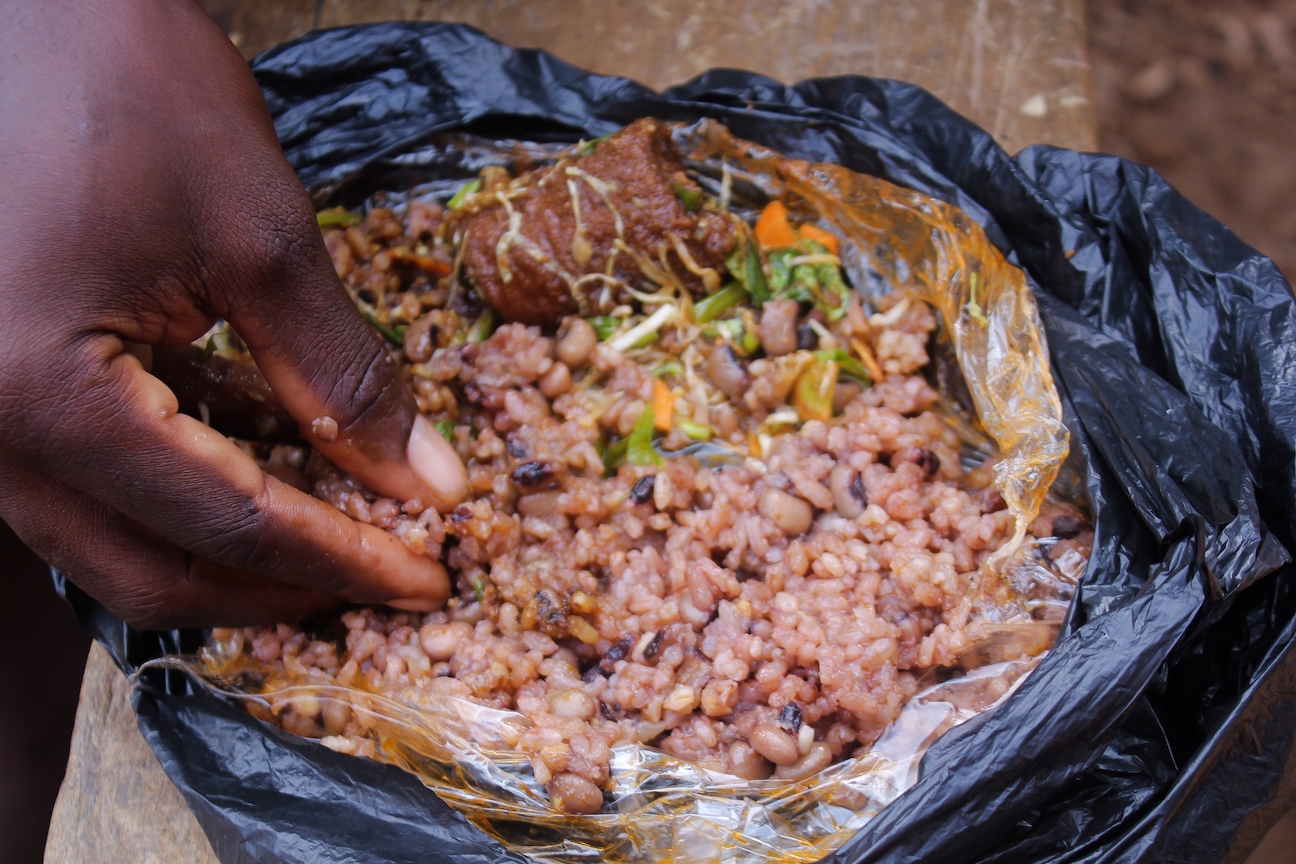As the price of delicacies made from cowpea, or beans, continues to rise in Ghana, some vendors are hoping that genetically modified cowpea will increase supplies and reduce consumer costs.
Cowpea is a key ingredient in such popular Ghanaian dishes as waakye, gari and beans (also known as red-red or gorbe) and kose. It typically offers consumers a cheap source of protein. But with the price of cowpea increasing 11 percent between October 2021 and January 2022, many food vendors have begun charging more for the same quantity of food, leaving customers unhappy.
Abena Diasempa runs a small food joint along Alliance Français Street in Accra, where she sells rice and beans. She told the Alliance for Science that her customers keep complaining about the rising price of her dishes, but she is helpless to do anything about it.
“Prices of foodstuffs on the market have shot up, and I need to break even,” she said. “Even red-red, which they could previously afford, is getting too expensive for them now. Last year, I sold a plate ranging from 2 Ghana cedis upwards, but now I can only serve the same quantity from 3 Ghana cedis upwards. Cowpea is now expensive on the market.”
Ibrahim, who works as a vulcanizer, said his favorite lunch meal of gari and beans is not affordable anymore.
“Just a couple of years back, I used to spend 5 Ghana cedis on gari and beans and fried plantain and that would take me through the day,” he lamented. “Today, 10 Ghana cedis worth of gari and beans and plantain doesn’t take me anywhere. I’ve stopped buying lunch now because I can’t afford it anymore. Instead, I bring my own food from home all the time.”

Abdulai Muniru, who grows cowpea on 10 acres, told the Alliance for Science that the price of a bag of the popular legume has shot up due to the rising cost of fertilizer and pesticides used to protect his crop from the pod borer pest.
“If you don’t spray the crop, the pod borer insect will damage all your seeds,” he said. “Sometimes, there is a shortage of these chemicals on the market, and we are compelled to buy them early and stock them before cultivation so (that) we don’t encounter any challenges along the way. But because the chemicals are getting increasingly expensive, we have to try get loans to buy them and pay back later. If you don’t have money, or are unable to secure a loan, you risk losing your farm produce to pests.”
In a bid to reduce insect damage and cut pesticide use, scientists in Ghana developed Bt cowpea, which has been genetically modified to resist the pod borer. It has proven highly successful in Nigeria, where farmers report higher yields and significant reductions in pesticide applications. The African Agricultural Technology Foundation (AATF) led development of the Bt cowpea in both countries.
In Ghana, trials of the GM cowpea developed by the Savanna Agricultural Research Institute (SARI) have shown great potential for contributing to food and nutritional security, reducing pod damage and promoting grain quality. The National Biosafety Authority is currently reviewing an application to make the Bt cowpea seeds available to farmers.
Dr. Jerry Nboyine, senior research scientist at SARI and principal investigator for the Ghana Bt Cowpea Project, told the Alliance for Science that cowpea is a source of high-quality protein that is cheaper than animal protein. It also has good quantities of important minerals and other nutritional elements, most of which are antioxidants.
Some vendors who shared their plight with the Alliance for Science appeared convinced that having GM cowpea varieties resistant to pest damage will reduce prices.
Area Mama, a popular waakye vendor in Cape Coast, said she is excited about the innovation, but hopes for a fair price, good taste and constant availability.
Daavi, a red-red vendor, said she is ready to buy and cook the GM cowpea for her business when it is allowed on the market. She has had bad experiences with cowpea that was intensively sprayed with pesticides.
“Usually, those ones that have a lot of chemicals don’t soften sufficiently when cooked,” she explained. “We don’t want those. If this [GM] cowpea is soft when cooked, why not, we will patronize it.”
Souiba sells a popular breakfast delicacy known as koko (millet pudding), which is usually accompanied by kose (bean cake). She hopes the new GM cowpea will be able to make healthy and delicious kose.

“This new cowpea should be healthy, have the ability to swell and taste good,” she said. “That way, we can make very good kose. Not all cowpea varieties are good for kose.”
Nboyine noted that the Bt gene has been introduced into the ordinary cowpea varieties commonly found in the market. It only protects the crop against the pod borer pest. “All the other desirable properties of the beans that farmers and consumers are interested in remain intact. It will still taste the same, swell the same and nothing will change.”
He added that the GM cowpea, if approved, will increase production and reduce Ghana’s reliance on imports, making cowpea cheaper and affordable for all.
Image: A roadside vendor in Cape Coast, Ghana, sells dishes made from cowpea. Photo: Dennis Baffour-Awuah
